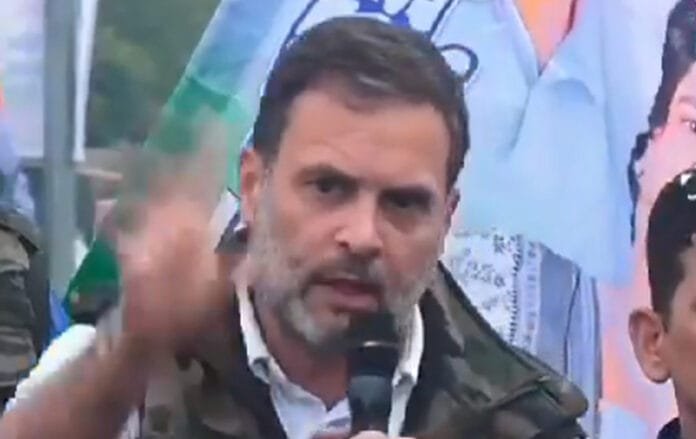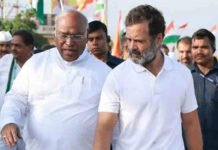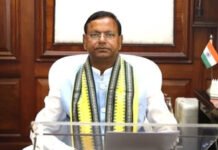In a politically charged courtroom drama that could have significant ramifications for the national discourse, Congress leader Rahul Gandhi was on Wednesday granted bail by a Nashik court in connection with a criminal defamation case linked to his past remarks on Vinayak Damodar Savarkar, the revered Hindutva ideologue and freedom fighter. Gandhi, appearing in person, stood firm before the judiciary and declared himself innocent, setting the stage for a high-stakes legal and political battle.
Backdrop: Defamation Case Rooted in Savarkar Remarks
The origins of the case date back to 2023, when Rahul Gandhi, during a rally in Maharashtra, made comments perceived as derogatory toward Veer Savarkar, a historical figure deeply respected by the Bharatiya Janata Party (BJP) and the Sangh Parivar. Gandhi’s remarks, which questioned Savarkar’s actions during British rule and suggested complicity through a mercy petition, were immediately seized upon by political opponents as an affront to nationalist sentiment.
This led to multiple defamation complaints being filed across Maharashtra, with the most significant one surfacing in Nashik, where a local activist affiliated with a pro-Savarkar group filed a formal legal challenge under Sections 499 and 500 of the Indian Penal Code.
Court Appearance: Gandhi Maintains Composure, Asserts Innocence
Appearing before the court on Wednesday morning, Rahul Gandhi arrived amid tight security and widespread media attention. Dressed in a white kurta and flashing his characteristic smile, the Wayanad MP remained composed throughout the proceedings.
When asked to respond to the charges, Gandhi asserted unequivocally that he was “not guilty” and refused to express any regret or retract his statements, underscoring his long-standing position that freedom of expression must remain sacrosanct in Indian democracy.
The magistrate, after hearing both parties, granted him conditional bail, with a bond of ₹15,000 furnished by local Congress leaders.
Congress Stands United Behind Gandhi
Following the hearing, senior Congress leaders including Jairam Ramesh, Mallikarjun Kharge, and Sonia Gandhi issued strong statements supporting Rahul Gandhi’s stance, calling the case “an orchestrated attempt to silence dissent.”
Party spokespersons emphasized that the BJP was attempting to weaponize the judiciary to muzzle opposition voices, especially ahead of the crucial 2025 general elections. Congress workers staged demonstrations in Mumbai, Pune, Nagpur, and other major cities across Maharashtra, chanting slogans in support of Gandhi and condemning the charges.
Political Storm: BJP, Shiv Sena (Shinde faction) Hit Back
On the other side of the aisle, leaders from the BJP and the Eknath Shinde-led Shiv Sena sharply criticized Gandhi’s remarks and his refusal to retract them. Union Minister Narayan Rane slammed Gandhi’s courtroom defense as a “mockery of our freedom fighters’ sacrifices.”
Savarkar’s legacy continues to be a politically sensitive subject in Maharashtra, and the BJP has consistently projected him as a hero who deserves national recognition. Several right-wing groups have demanded that Gandhi issue an unconditional apology or face intensified legal consequences.
Legal Analysis: What Lies Ahead for Rahul Gandhi
While the grant of bail provides temporary relief, legal experts caution that the road ahead for Rahul Gandhi is far from smooth. If found guilty, he could face a maximum sentence of two years, potentially triggering disqualification from Parliament under Section 8 of the Representation of the People Act, 1951, as seen in previous defamation cases.
However, given the high-profile nature of the case and the constitutional questions surrounding free speech, it is likely that the matter will be pursued in higher courts, possibly reaching the Supreme Court. Gandhi’s legal team is reportedly preparing a robust defense strategy citing precedent and democratic protections.
Savarkar Controversy: A Long-standing Flashpoint
Vinayak Damodar Savarkar remains a polarizing figure in Indian history. While his followers hail him as a visionary who foresaw the concept of Hindutva, critics have long pointed to his mercy petitions to the British and his alleged ideological rigidity. Gandhi has repeatedly used Savarkar’s legacy to contrast Congress’s vision of secular nationalism with what he terms the BJP’s “divisive politics.”
His earlier jibes — including statements like “My name is not Savarkar, I don’t apologize” — have become rallying cries for Congress supporters, even as they spark outrage from the ruling establishment.
Media Reactions and Public Sentiment
National media has offered wall-to-wall coverage of the courtroom proceedings, with analysts debating the legal, political, and moral dimensions of Gandhi’s actions. Hashtags like #RahulGandhiInNashik, #SavarkarRow, and #DefamationPolitics trended across social media platforms as netizens split along ideological lines.
Many neutral observers lauded Gandhi for standing his ground and facing the legal process head-on, contrasting his approach with leaders who evade accountability. Others criticized him for “needlessly provoking” a sensitive issue, suggesting that his strategy could backfire electorally in Maharashtra and other states with a strong Savarkar base.
Implications for 2025 Elections and Opposition Unity
The incident has implications that extend far beyond the courtroom. With the 2025 Lok Sabha elections fast approaching, Gandhi’s decision to face the court without capitulating is being viewed as an effort to rebrand his political persona — from a dynastic leader to a principled crusader for civil liberties.
The Congress is also seeking to use the moment to galvanize opposition unity, positioning Gandhi as a symbol of resistance against the BJP’s perceived authoritarianism. Leaders from AAP, RJD, SP, and DMK have voiced concern over the growing trend of legal cases being filed against opposition figures, hinting at a broader political realignment.
Rahul Gandhi’s Statement: “Truth is My Weapon”
After emerging from the court, Gandhi briefly addressed a throng of reporters and supporters gathered outside the premises. Speaking in Hindi, he stated:
“I have full faith in the Indian judiciary. I have said nothing wrong and I stand by every word. I will not apologize for speaking the truth. Truth is my weapon, and I will continue to use it.”
His remarks were met with thunderous applause, signaling that the courtroom drama may just be the beginning of a larger political campaign.
Conclusion: A Battle of Legacy, Ideology, and Law
The Rahul Gandhi defamation case has swiftly transformed into a clash of ideologies, bringing into sharp focus the interplay between history, politics, and free speech in contemporary India. As Gandhi gears up for a protracted legal battle, the eyes of the nation — and the political world — remain fixed on how this narrative unfolds.
Whether the court’s final judgment tilts in his favor or not, Rahul Gandhi has already turned the trial into a referendum on dissent, one that could shape India’s democratic trajectory in the years to come.
















